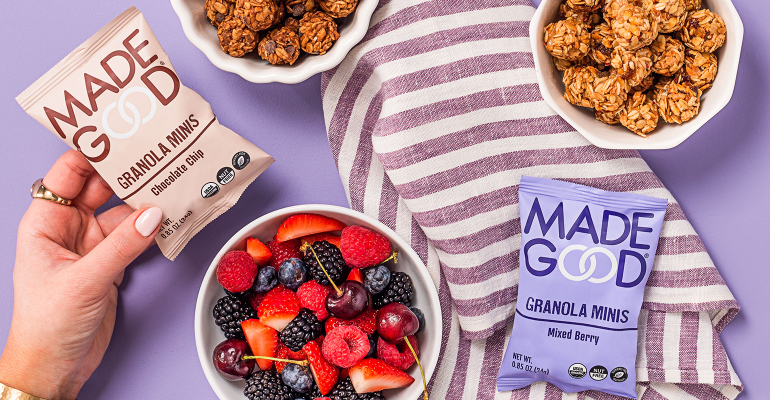
While plastic may be the backbone of the packaging industry, there’s no denying the devastating effect it has on the environment. Globally, 91% of plastic waste is not recycled and the ocean is awash in millions of tons of plastic waste. It’s been estimated that the annual flow of plastic into the ocean will nearly triple by 2040, and without action, that amount could swell from 11 million metric tons to 29 million metric tons per year —the equivalent to 50kg (110 pounds) of plastic per meter of coastline worldwide.
Riverside Natural Foods is the food company behind MadeGood, Good To Go, and Cookie Pal brand snacks. As a user of plastic packaging for provide barrier protection against the effects of oxygen and moisture, Riverside took a stand in 2021 to address its role in the global plastic packaging issue head-on, developing a target-oriented, sustainable packaging roadmap. The company shifted from a “take, make, waste” approach to “borrow, use, return” and partnered with rePurpose Global to achieve its goals with sustainable food packaging.
Founded in 2016, rePurpose Global is a Plastic Action Platform that brings together brands, consumers, innovators, and policymakers to collectively combat the plastic waste crisis and drive change on a global scale. rePurpose Global has helped more than 300 companies measure and reduce their plastic footprints and along the way, has recovered over 33 million pounds of plastic waste from the environment, protecting vulnerable coastal regions across the Americas, Africa, and Asia and delivering waste management services to millions of underserved people.
To date, Riverside’s partnership with rePurpose has helped collect more than 2 million pounds of “low-value plastic waste” equivalent to more than 50 million plastic bottles and more than 180 million plastic bags. The work has also helped support more than 310 workers with increased incomes and social security while providing over 43,000 households with formal waste management for the very first time.
Members of the Riverside and rePurpose teams traveled to Tamil Nadu and Kerala, India, in 2022 to participate in The Plastic Reality Project, an up-skilling initiative that gives plastic action stakeholders the knowledge to help shape plastic reduction efforts in their respective fields. The experiences on that trip heightened Riverside’s sense of responsibility and urgency, and effectively fueled its passion to drive positive change within the snack food industry.
The twisting path to snacks packaging sustainability.
Riverside’s Taylor Stanley, corporate impact strategy lead, tells Packaging Digest that in addition to funding the recovery of existing nature-bound plastic waste, the company has been getting its own house in order in terms of reducing its reliance on existing packaging formats and exploring how to best transition away from plastic to more sustainable materials.
What’s more, Riverside furthered its commitment to sparking industry-wide change by declaring it would commit to a three-pronged initiative focused on reducing its use of petroleum-based plastics in primary packaging by switching all applicable products to paper, sourcing bio-based plastics, and actively supporting research and development in circular packaging solutions.
Things got off to a bumpy start in 2020 when Riverside attempted a paper packaging solution for its 36-gram weight Granola Bars.
“Utilizing our existing technology at the time, this experiment ultimately failed as product quality suffered in real-world market circumstances,” Stanley admits. “The significant shelf-life loss resulted in us temporarily transitioning back to our standard multi-layered structure while we reflected and strategized on how to best embark on more research.”
Undeterred, Riverside successfully swapped the secondary packaging material of its 15-count Chocolate Chip Granola Bars Retail Family Pack from corrugated to paperboard in 2022, resulting in an overall box material reduction of about 15% by weight.
Sustainable snacks packaging moves to paper and compostable bioplastic options.
Last year the company also partnered with its packaging equipment vendor to re-address its work on a plastic-free bar structure, focusing on technology solutions required to switch from conventional plastic wrappers to paper.
“We’ve since successfully acquired the parts needed to complete our own internal testing, with a comprehensive schedule lined up for Q4 2023,” says Stanley. “This series of testing will expedite the research needed to validate and subsequently activate a phased rollout strategy for paper packaging transitions as early as 2024.”
On the bio-based plastics front, Riverside is currently pursuing polyhydroxyalkanoates (PHA)-based, home-compostable certified plastic bar wrapping and pouching structures. That also presents challenges.
“The current recycling infrastructure across North America does not ensure that flexible plastics are contained and do not leak into nature,” Stanley explains. “We are taking the approach of assuming a worst-case scenario for the end-of-life stage with our packaging and solving for those circumstances [by] collaborating with credible vendor partners who have gone through third party verification and who have completed their own in-house testing.
“In addition, we will be completing our own internal due diligence as well to verify replicability before launching any new structures into the market,” he adds. “For home compostable specifically, we recognize that education will also be a crucial component to the overall solution’s success in the market and therefore we would accompany these innovations with a consumer-specific education campaign to support awareness and adoption.”
Renewably sourced paper packaging and shift to compostable packaging solutions represent the foundational beginnings of Riverside’s foray into the world of circular packaging solutions. Other active R&D areas involve exploring alternative material sources, such as bagasse fibers and other upcycled materials.
In addition to working with its packaging technology OEMs to ensure a successful machinability transition for new packaging structures and materials, the company is also ensuring that it receives approval from How2Recyle for verification of all its packaging-related recyclability claims in North America.
“For our paper recyclability testing specifically, we have found great partners in Western Michigan University,” Stanley comments. “We plan to continue this partnership as we develop more structures and require more verification. Third-party verification for claims is a standard for Riverside and we will not be making any packaging claims without rigorous testing results to provide as evidence.”






